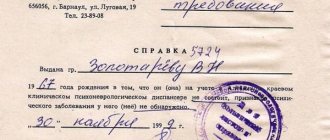Disabled people are people who have a congenital or acquired health disorder that leads to a limitation of full life activity. At the state level, this category of citizens receives social protection and material support.
Otherwise, in their rights, people with disabilities are no different from ordinary people and, in particular, have the right to marry. Therefore, the issue of divorce from a disabled person may also arise.
Is it possible to divorce a disabled person?
The text of the Family Code does not contain the concept of a disabled spouse.
Thus, disability does not regulate marital relations in any special way. The conditions for registering and dissolving a marriage with a disabled person are no different from the rules and legal norms of ordinary citizens. Therefore, the law allows divorce from a disabled person.
The only exceptions are the pregnancy of the spouse or the presence of a child who is less than 1 year old.
Normative base
The procedure for declaring a husband or wife incompetent, and dissolving a marriage with a person suffering from mental disorders are important legal actions that are strictly regulated by law.
| Law | a brief description of |
| Constitution of the Russian Federation | Art. 39 – in the Russian Federation there is a system of social support for persons with disabilities. Art. 60 – every citizen of the Russian Federation who has reached the age of 18 has the right to exercise their rights and obligations in full. |
| Civil Code of the Russian Federation | Art. 29 – establishing a person’s incapacity: grounds, procedure and features. |
| Resolution of the Constitutional Court of the Russian Federation of June 27, 2012 No. 15-P | Grounds for declaring a citizen incompetent, the procedure for appointing guardianship over a person, features of the procedure. |
| Family Code of the Russian Federation | Art. 19 – divorce in the administrative body – the registry office. Art. 21 – dissolution of the marriage union through the court. Art. 25 – the moment of termination of marriage. |
| Federal Law “On Acts of Civil Status” | Chapter IV records the sequence and features of registering a divorce in the registry office departments. Art. 31 – grounds for registering a divorce. Art. 34 – sequence and rules of the procedure initiated unilaterally. Art. 38 – form and structure of the divorce certificate. |
| Civil Procedure Code of the Russian Federation | Art. 23 – jurisdiction of magistrates. Art. 24 – rules according to which cases are considered by district courts. Art. 131 – requirements for the claim. Art. 132 – documents that are attached to the application. Art. 154 – time limits for consideration of the case in court. Art. 321 – right to file an appeal. In general, the norms of subsection II of section II regulate the procedure for organizing claim proceedings. |
| Tax Code of the Russian Federation | Art. 333.26 – the amount of the state fee in case of applying to the registry office. Art. 333.27 – specifics regarding the payment of fees to the registry office. Art. 333.39 – preferential conditions in case of divorce in the registry office. Art. 333.19 – the amount of the fee for going to court. Art. 333.36 – benefits when paying fees for applying to the courts. |
The procedure for filing a divorce from a disabled person
The presence of disability in one of the spouses, with rare exceptions, does not in any way affect the specifics of the trial. Therefore, the procedure for filing a divorce with a disabled person is almost identical to that between ordinary capable citizens.
Where to contact?
There are two ways to divorce a disabled person: through the registry office or in court. It all depends on the circumstances of the divorce and the degree of agreement of the spouses with this process.
The first option, divorce through the registry office, is suitable for couples without children and who agree to divorce. In a particular case, it is possible within 30 days.
There are several exceptions when, even if there are children, a marriage can be dissolved by submitting only one application to the registry office and only by one of the spouses:
- recognition of one of the spouses as missing;
- recognition of the incapacity of one of the spouses as a result of the presence of a psychological illness;
- being in prison for more than three years.
Divorce from a disabled person through the court is carried out in the following circumstances:
- whether spouses have common small children;
- occurrence of property disputes;
- refusal to divorce one of the spouses.
If the disabled spouse refuses to dissolve the marriage voluntarily, you should contact the judicial authorities with an application. The reason “disability” should be indicated in a special column.
After the initial hearing, the court will subsequently conduct an examination to prove that the spouse has a disability and disability. With the help of this conclusion, confirming the presence of a group in an incapacitated spouse, you can obtain a divorce without mutual consent.
You should contact the registry office and write a corresponding application on form No. 9. In this case, divorce is possible even if there are young children.
Application for divorce
As mentioned above, if both spouses, where one of them is disabled, agree to divorce, then the corresponding application is submitted immediately to the registry office. It is filled out according to form No. 8. If the incapacitated spouse is against the divorce, then you should first go to court.
To divorce a disabled person, a statement is written to the court, indicating:
- name of the court or full name judges;
- FULL NAME. of the person submitting the application or full name. his representative, as well as information about his location;
- FULL NAME. the defendant, as well as information about his place of residence;
- the reason for divorce is disability;
- if there is a medical report, proof of the reason for divorce is attached;
- a document confirming the refusal of the registry office to divorce a crippled person;
- information about common children.
After receiving a positive court decision concluding that the spouse is incompetent, you should contact the registry office and fill out an application in Form No. 9.
List of required documents
When filing for divorce from a disabled person, it is important not to forget about other documents:
- receipt of paid state duty for the upcoming divorce;
- documents confirming the presence of common young children (birth certificate);
- two copies of the statement of desire to divorce (the other copy is required for the defendant);
- a conclusion confirming the incapacity of the second spouse.
Payment of state duty
With mutual agreement, the state duty is paid in the amount of 650 rubles for each spouse. If applications are submitted by one spouse, and the other is disabled with a group, then the amount is 350 rubles.
You can pay this fee at any bank through a cash desk or terminal, in your Sberbank personal account or through the government services portal. Proof of payment of the fee is a printed receipt.
You can contact the registry office only at the institution where these relations were previously legalized, or you can submit an application using the public services portal, or you can contact the MFC in person.
Alimony for a disabled wife or husband during a divorce
According to Article 89 of the RF IC, spouses are obliged to provide each other with material support not only during marriage, but also after its dissolution.
The grounds for receiving alimony after a divorce include::
- child care under 3 years of age;
- caring for a child with a disability;
- disability of one of the spouses.
The law allows for the possibility of receiving alimony from a spouse if the disability was acquired during marriage or within 1 year after divorce. If a spouse has reached retirement age, then after a divorce he can apply for alimony for 5 years. To satisfy the claim, it is necessary to prove that the relationship was long-term, and the disabled spouse behaved with dignity in it. Alimony payments are not prescribed if the disability was caused by drug or alcohol use. In all other cases they must be paid in full.
The duration of payments is determined individually. In most cases, alimony for a disabled person of group 1 during a divorce is paid for life. In other cases, alimony may be canceled upon restoration of working capacity. To do this, both parties must submit a corresponding application.
To collect alimony, a disabled spouse must apply to the court at his place of residence. Theoretically, it is permissible to submit documents to the judicial authorities at the defendant’s place of residence, but for a person with a disability this can be difficult.
The following documents must be attached to the application:
- disability certificate or health certificate;
- a document indicating the amount of benefits and pension of a disabled person;
- a copy of the marriage or divorce certificate;
- a copy of the plaintiff's passport;
- a document confirming the income or property status of the defendant.
After the court makes a decision regarding the calculation of payments, it must be transferred to the bailiff. Based on this, he will begin enforcement proceedings.
Alimony for a disabled spouse during a divorce can also be paid voluntarily. For this purpose, a bilateral agreement is drawn up. It must be certified by a notary. Otherwise, the agreement will not have the status of a writ of execution. A notarized agreement will allow the collection of funds in the event that a person refuses his obligations.
The bilateral agreement on voluntary payment of alimony specifies:
- frequency of payments;
- amount of payments;
- the ability to index the amount;
- methods of transferring funds.
Division of property after divorce
There are 3 ways to divide acquired property during a divorce from a disabled person:
- division of property by common agreement of the parties;
- division of property according to a previously concluded marriage contract;
- division of property by court.
The first method is the simplest and least expensive. The division of property is carried out as a result of an oral agreement between the former spouses, and this method eliminates the cost of court or lawyer.
The second option for dividing property is carried out under a marriage contract. You will need to consult a lawyer who will certify the results and correctness of the execution of such an agreement.
The latter method is typical for the division of property if the former spouses do not come to a verbal mutual agreement. The applicant will need to file a claim with the court for division of property as a result of divorce and document his right to this property.
When dividing property, the court is guided by the amount of personal earnings, health status, as well as the fact that children live with the former spouses.
If it becomes impossible to divide any property into two equal parts, the spouse who received ownership of this property pays his former half material compensation.
Dear readers! To solve your problem right now, get a free consultation
— contact the on-duty lawyer in the online chat on the right or call:
+7
— Moscow and region.
+7
— St. Petersburg and region.
8
- Other regions of the Russian Federation
You will not need to waste your time and nerves
- an experienced lawyer will take care of solving all your problems!
Can a disabled ex-spouse file for alimony?
The Family Code states that one of the spouses with a health problem has the right to file a claim for alimony against the former, healthy spouse.
The court's decision will be influenced by the following provisions:
- income and availability of property of the plaintiff and defendant;
- expenses of a cripple;
- presence of a child.
In addition, the court has the right to refuse to award payments under the following circumstances:
- marriage lasting less than a year;
- obtaining a group as a consequence of leading an unhealthy lifestyle;
- indecent conduct during marriage towards the defendant.
An incapacitated spouse can file a claim for alimony no later than one year after the divorce.
Thus, it is quite possible to divorce a disabled person. And, as practice shows, a divorce from an incompetent husband or wife is not much different from a regular divorce. However, each case is individual, and seemingly similar cases do not always end in the same court decision.
What is taken into account when assigning alimony
The court first of all pays attention to confirmation of the spouse’s incapacity and need. For example, a group 3 disabled person can work and support himself. The issue of alimony is considered on an individual basis. And only disabled people of group 3, who cannot be provided with work on the recommendation of VTEK, will probably be able to claim payments. This is evidenced by judicial practice, for example, the consideration of case No. 11-170/2014, carried out in Rostov-on-Don on September 22, 2014.
The second most important factor is the income of the spouse from whom alimony is required. The amount of payments established by the court directly depends on the profit.
Deadline for applying for alimony for a disabled spouse
According to Art. 107 of the RF IC, if a husband or wife has the right to collect alimony, they can go to court at any time.
If a disabled wife or husband proves that attempts were previously made to receive financial assistance from the spouse, but were refused, the recipient has the right to recover the amount of alimony for the previous period, but no more than 3 years before going to court.
Registration of alimony on a voluntary basis
If the couple who decided to file for divorce still have friendly relations, they can agree on alimony and enter into an agreement.
The legal basis for contractual relations is laid down in Chapter. 16 IC RF. According to Art. 99 of the RF IC, the agreement is concluded between the person who undertakes to pay alimony and the recipient himself.
The document is an agreement that states the obligations of one party to provide for the other, indicates the amount of payments, and stipulates the frequency of their receipt. One of the mandatory items is sanctions for failure to fulfill obligations.
As part of the agreement, it is possible not only to establish the order of cash receipts, but also to transfer material assets for alimony.
The document is drawn up in writing and certified by a notary.
Amount, amount of alimony
When determining the amount of alimony for a disabled husband or wife, the following factors are taken into account:
- Availability of the disabled ex-spouse with the funds necessary for a normal existence.
- Does he need extra money to meet important life needs?
- The ex-husband and wife have dependents or common children.
- Do adult children provide financial assistance to a spouse in need?
The amount of alimony for an incapacitated ex-husband or wife can be determined in one of two ways:
- by concluding a mutual agreement that describes specific payment amounts;
- by decision of the judicial authorities.
Such financial support is only in cash and is paid in hard cash. In this case, the amount of payments is indexed based on the cost of living. Assigning maintenance as a percentage of all income from spousal alimony is not practiced.
If the region does not have the specified cost of living, indexation occurs based on the total amount for Russia.
Procedure for paying alimony for a disabled spouse
The method and time period for alimony payments by one of the divorced spouses to the other depends on how the alimony recipient achieved such support.
If assistance was awarded through the court, then payments will be received once a month in a fixed amount, which depends on the cost of living in the plaintiff’s territory of residence.
IMPORTANT: Unlike maintenance awarded through court proceedings, assistance by agreement can be the transfer of any property (for example, an apartment, a summer house, a car), which can later be used by the alimony recipient to make a profit from the sale or rental.
The procedure for forced calculation of alimony for the husband or wife of disabled people of group 2 or group 3 is no different from the general conditions for collecting and withholding alimony for children.
If you refuse to comply with a court decision, you must:
- Obtain a writ of execution from the court to collect alimony.
- Send the writ of execution to the FSSP;
- Wait until enforcement proceedings are initiated.
Upon further reaching an agreement on voluntary payments, the claimant can always withdraw the writ of execution from the bailiffs. In this case, the debtor will pay maintenance on his own initiative.
If the financial situation of the parties changes, the interested party has the right to demand a reduction, increase in alimony, or even insist on the termination of its payment. Example: Former wife Oksana Z., who has a disability of the 2nd group, achieved through the court the recovery of alimony from her ex-husband. Their size amounted to 7 thousand rubles. At the time of the penalty, she did not have a job; for medical reasons, almost any work was contraindicated for her.
After 2 years of payments, the ex-husband filed a lawsuit to cancel the obligation to pay alimony. The claim stated that Oksana Z. currently works as the chief accountant in the company, her income is twice his own. Rehabilitation procedures as part of the treatment have been completed and the need for additional support has disappeared.
The court, having examined the case materials, sided with the ex-husband and canceled the alimony. The judge considered that Oksana Z.’s current income is sufficient to support her, she is currently able to work with some limitations, and her income level is three times the subsistence level for the adult population.
How not to pay child support to a disabled person
In addition to the cases described above, when the court refuses to collect alimony (the citizen himself caused himself to be disabled or received it outside the marriage union), payments are not made if the able-bodied spouse has other dependents, for example, small children from a new marriage or elderly parents, or he repays the loan.
Financial assistance to the ex-wife is assigned only when the husband has enough financial resources to pay it. If his income is below the subsistence level, then the application for recovery will be rejected, since the payer will not be able to provide himself with the bare minimum.
How is the need for alimony determined?
In order for the court to decide to award alimony to a disabled spouse after a divorce, he must prove his need for financial assistance from his former partner. First of all, you will need certificates and documents confirming your unsatisfactory state of health, and as a result, the inability to work fully.
In addition, statements of income received and checks for medicines and treatment can be used as arguments; if the judge sees that the money available to a disabled person is not enough to maintain his condition, then most likely the claim will be satisfied.
The procedure for determining the place of residence of common children
There are two ways to determine who the children will be with after a divorce from a disabled person:
- enter into a joint agreement;
- with the help of a court decision and opinion.
To determine the place of residence of children in the first way, it is enough to draw up a written agreement in a simple form and, in the case of mutual consent of the parents, sign it. It is not necessary to notarize such a document.
The second method is used in all other cases when parents cannot reach a common agreement on resolving this issue.
When deciding on the fate of the children's future residence after divorce, the court, first of all, focuses on the interests of the child.
When determining the child’s place of residence, the court will take into account:
- child's attachment;
- age of the child;
- individual characteristics of parents;
- conditions of education, development and care for a minor.
Child support after divorce can be deducted from disability benefits.
How to take care of your child after going through a divorce
How to build it so that the children are happy? – Firstly, practice shows that if a new relationship is built in the first year after a divorce, it is usually unpromising. Because, as a rule, in the first six months after a divorce, a person experiences a separation acutely: self-esteem falls, and an inadequate assessment of others arises. After these six months, a jump in self-esteem occurs, and a person has a desire to find a new partner. And often during this period a person meets someone whom he mistakes for a “prince on a white horse” (or a princess). "
He’s the best, everything will be different with him.” After three months, a person begins to recover from the mental trauma caused by divorce and begins to perceive everything adequately. And he sees his new partner in the true light. Therefore, you should not build a new relationship in the first year after a divorce.
How to reduce the psychological damage that divorce causes to a child? – Even before the divorce, the child feels that the relationship between the parents is deteriorating, that something is happening. As a result, children develop, for example, nervous tics, absent-mindedness, and a decrease in academic performance. Teachers are the first to notice this. And parents may think that they are very successful in hiding their discord from their children. Therefore, first of all, you need to sincerely explain to your child that everything between you is not the same as before.
A child will experience mental trauma after a divorce, but we can soften it with explanations of what happened and what we will do next. Parents must admit to the child the responsibility of both of them for the divorce: “We are to blame.
Somewhere we couldn't help each other. Somewhere they couldn’t understand each other. And now it is very difficult for us to unite what has been broken; now it will not be restored.”











